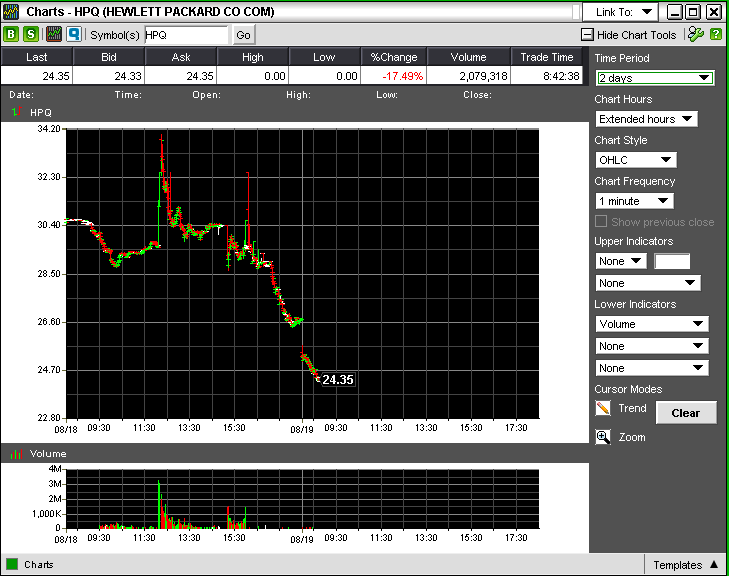Analysts crush HP's revamp: 'Juggling in a wind tunnel'

HP's trio of bold decisions---discontinuing WebOS devices, spinning off the PC unit and a $10 billion acquisition of Autonomy---was universally panned by Wall Street analysts.
In some cases, analysts can be accused of Monday morning quarterbacking. In HP's case, the reaction to Leo Apotheker's moves (Techmeme, CNET roundup, HP topic page) to transform the company equate to Friday morning target practice.
The biggest beef with HP was its acquisition of Autonomy, which drains the balance sheet and will take years to pay off based on internal rate of return (IRR) calculations. IRR metrics are used to justify investments.
Also: ZDNet AU: Retailer blasts HP's handling of TouchPad, stops selling it
Meanwhile, HP's transformation moves are coming from a position of weakness. In other words, HP's prospects will get worse before any improvement.
Here's a sampling of analyst comments:
Deutsche Bank analyst Chris Whitmore said:
HP also announced plans to acquire Autonomy, an enterprise software company based in the UK for ~$42 per share which we believe will destroy shareholder value (IRR of ~1-2% and HP cost of capital ~8%). While we believe the shift in focus to higher margin Software and Services has some strategic merit, we are concerned about HP’s growing track record of paying large premiums for assets. Further, the timing of this large acquisition (deteriorating macro environment) leaves HP’s balance sheet relatively leveraged entering this slowdown and poorly positioned to act on other, perhaps ‘cheaper’ transactions.
Whitmore gave HP shares a $20 price target. HP would have been better off buying back shares with its $10 billion in cash. He added that HP is 'juggling in a wind tunnel.' Sterne Agee analyst Shaw Wu said HP left its PC unit twisting in the wind:
At $40 billion in annual revenue, its PC operation is about 30% of total revenue and 16% of profits. Over the next 12-18 months, HP commented that this business will undergo a strategic review to determine whether it should be split, spun-off, and/or sold. While we agree with the strategic rationale, we see three looming issues including: (1) uncertainty surrounding its PC operation that will likely put stress on its PC financials that are still material; (2) depressed valuation in the event of a sale or spin-off as everyone knows it’s for sale; and (3) bundling opportunities become limited potentially impacting overall revenue.
Wu's other beef is that HP had a clear spin off playbook to follow. Motorola outlined the steps when it spun off Motorola Mobility. IBM also followed a good course with the sale of its PC unit to Lenovo. HP's PC unit spin-off plans---preannouncing the move without any concrete plans---puts the business in an uncomfortable limbo.
Auriga analyst Kevin Hunt said that HP is simply a mess. He said Walter Hewlett, who argued for a breakup of the company in a legal spat over HP's Compaq merger, may have been right. Hunt also blasted the Autonomy deal:
Autonomy has been viewed by many as a “roll-up”, and the price tag of roughly 16x forward revenue and 64x forward PE seems extreme, and probably says a lot about the growth prospects of HP’s core software businesses. While HP expects the deal to be accretive on an EPS basis, it is massively dilutive to shareholder value if the true cost of capital is considered rather than current cash rates.
Bottom line from analysts: HP shares are expected to be a classic "value trap." Just when you think the fundamentals and financials couldn't get much worse at HP---they do. As a result, cheap shares just get cheaper.
Shares were down 17 percent in premarket trading:
Related:
- Oracle's decision to nix Itanium support hurting HP sales
- Making sense of HP's Autonomy acquisition
- Palm. HP. Who owns WebOS next?
- HP acquiring Autonomy - is this HP's IBM moment?
- A tale of two failures: Microsoft's Kin and HP's TouchPad
- HP's WebOS conundrum: Sell the IP or try licensing?
- HP's Apotheker recounts TouchPad disaster in post mortem
- HP punts on WebOS, discontinues TouchPad, cuts outlook
Around the network:
